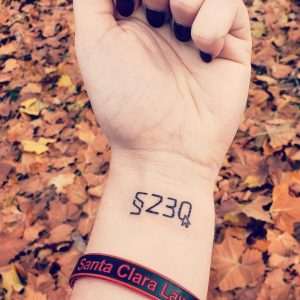Section 230 Applies to Facebook’s Post Removals and Account Suspensions–King v. Facebook

King alleges Facebook removed multiple posts by him, and temporarily suspended his Facebook access on several occasions in 2018, for posts that Facebook deemed a violation of its terms of service (“ToS”). The crux of his claim is that Facebook has violated its ToS in removing his posts and suspending his account, and that Facebook treats black activists and their posts differently than it does other groups, particularly white supremacists and certain “hate groups.”
This is an easy Section 230 dismissal:
- ICS Provider: King admitted.
- Publisher/Speaker claims: Yes, because each claim “is based on Facebook’s provision of the service for use by others or its moderator decisions on which posts to remove or not and which accounts to suspend or not” (cites to Brittain v. Twitter and Fields v. Twitter)
- Third-party content: “all of King’s allegations rest on treatment of speakers (who make posts or otherwise provide content) and differential treatment of specific posts made either by himself or by other Facebook users”
The court summarizes:
Each of King’s claims against Facebook seeks to hold it liable as a publisher for either removing his posts, blocking his content, or suspending his accounts. These types of acts are barred by the immunity provided under Section 230 of the CDA….Numerous courts have applied Section 230(c)(1) at the pleading stage to dismiss the exact types of claims asserted here by King. [cites to Caraccioli v. Facebook, Lancaster v. Alphabet, Jurin v. Google, Federal Agency of News v. Facebook, Obado v. Magedson, Brittain v. Twitter]
The court distinguishes Darnaa v. Google because it only survived the plaintiff’s claim for breach of implied covenant of good faith and fair dealing. Still, in an extremely generous move, the judge allowed King to file a new claim “for retaliatory breach of the ToS based on the treatment of his speech that is critical of Facebook.” That is the same basic claim that failed in Noah v. AOL…in 2003… So that claim will not succeed, but it will take another round of litigation to confirm that.
Although everyone with intellectual integrity already knows this, the court reinforces that Section 230 applies to editing functions and is not available only to “neutral platforms” (emphasis added):
The goal of Section 230(c)(1) is to provide immunity to service providers from responsibility for posts made by their users and to allow for an editing and moderating process that does not hold providers liable for all defamatory or otherwise unlawful messages that they did not edit or delete
Judge Orrick 1, 230-haters 0.
Case citation: King v. Facebook, Inc., 2019 WL 4221768 (N.D. Cal. Sept. 5, 2019)